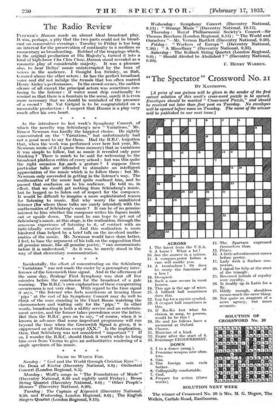As the introducer to last week's Symphony Concert, of which
the novelty wa4 Schlinberg's new Variations," Mr. Ernest Newman was hardly the happiest choice. Ile rightly concentrated em the ". Variations,' -but unfortunately had not a good word to say for them. " Had the B.B.C. forgotten that, when the work was performed over here last year, Mr. Newman wrote of it (I quote from memory) that as variations it was simple to follow, but as music it revealed only poor thinking ? There is much to ba: said for welcoming to the broadcast platform critics of every school : but was this quite the right occasion fcrit,..such a gesture ? I suppose the.- particular talks are irite.nded to stimulate an intelligent appreciation of the music which is to follow them : but Mr. Newman only succeeded in getting in the listener's way. The mathematics of the music had quite confused him, and he passed that confusion on to his audience. He told us, in effect, that we should get nothing from Schfinberg's music, but he begged us to listen out of respect for the composer. It would be difficult to imagine a more sophisticated reason for listening to music. But why worry the uninitiated listener (for whom these talks are surely intended) with the niathematics of Schiinberg's music ? It can be of no genuine interest to him whether the composer writes his fugues inside out or upside down. The most he can hope to get out of Schiinberg's music, at-this stage, is the realization, through the sensuous experience of listening to it, of contact with an individually creative mind. And this realization is more hindered than helped by a brief talk on the involved mathe- matics of the music. Mr. Newman would have done better,
I feel, to base the argument of his talk on the supposition that all genuine music, like all genuine poetry, "can conununicate before it is understood." As it was, he merely stood in the way. of that elementary communication.






































 Previous page
Previous page